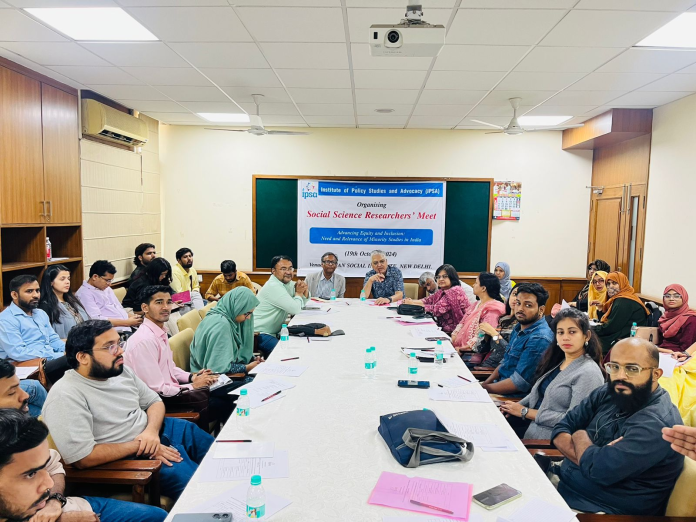On 19th October, 2024, the Institute of Policy Studies and Advocacy organised a one-day workshop at the Indian Social Institute. The meeting aimed to facilitate a deliberation among key constituencies – academia, PhD scholars, students, policy makers and CSOs with regard to prospects and challenges in conducting research /studies on minorities in the context of social inclusion and highlight the problems and also to develop recommendations for formulation and realign them with the national and state level policies.
As a way forward, the meeting also created an agency for minority research, to bring out a newsletter and journal on minority studies and formation of subject association of researchers associated with minority studies.
Over 40 research scholars as well as senior academics and experts from different universities participated. The Social Science Researchers’ Meet titled as Minority Studies in India was aimed at bringing together research scholars across disciplines and universities to discuss the relevance of minority studies and the need for further research in the area. Researchers from Jawaharlal Nehru University, Jamia Millia Islamia, Delhi University and other independent institutions shared their opinions and summaries of their own research work.
Kicking off the morning session, Dr Jawed Alam Khan, General Secretary, IPSA laid out essential points for the discussion as well as the fundamental objectives and structure of the workshop to follow. Highlighting the interventions of IPSA in the field as well as the discussions that predated the need for a workshop of this nature, Dr Jawed also contextualised the debates around minority studies and the areas for future research and collaboration.
Dr Furqan Qamar, Professor, Management Studies, Jamia Millia Islamia highlighted the need for institutions as they play a significant role in development. Highlighting the major challenges that lay in front of Indian Muslims, Prof Qamar also connected this to the principles of equity, equality and justice. He also stressed on the need for studies that investigate the causes of Muslim backwardness, and other aspects of Muslim exclusion such as their space in financial lending, strategies for addressing developmental concern, and the need for popular writing that is both accessible and critical.
Dr Tanvir Aeijaz, Ramjas College, Delhi University highlighted the existing debate about the use of minority versus Muslim in academic literature, and the importance of equity and affirmative action for Indian Muslims. He contextualised the Post-Sachar world where there is a continued need to address deprivation as well as the key question of representation.
Another question he highlighted was that of citizenship which has become increasingly important in rising contexts of denial and deprivation. He mentioned the need for deepening of democracy and equality of outcomes, highlighting how Indian Muslims have faced adverse inclusion practices.
This was followed by a panel discussion chaired by Dr Asheref Illiyan, Professor and Head, Department of Economics, Jamia Millia Islamia.
Dr Ghazala Jamil, Asst. Professor, Jawaharlal Nehru University spoke of the need to study Muslims with new frames, moving beyond existing and outdated frameworks and stereotypes. She mentioned the need for deeper study in areas such as land rights and urbanisation and Muslim women, who are often the subject of stereotypes and misconceptions.
Dr Khalid Khan, Asst. Professor spoke about the importance of empirical studies in the Muslim question, theories of inclusion and development, as well as cultural representation in the public sphere. Speaking on the commonly assumed reasons behind Muslim backwardness in higher education, both he and Dr Jamil stressed on the need for historicising and contextualising the reasons given, such as disinterest of Muslim students and parents.
Dr Zakaria Siddiqui, Associate Professor, Department of Economics, Jamia Millia Islamia spoke on the need to redefine and sharpen the definition of what is a minority, and the need to study data gaps.
This session was followed by an Open House, where all participants presented their research, their opinions on the need for minority studies and the steps to be taken to take forward this initiative. Various scholars spoke on the need for further collaboration, research groups, reading circles, establishing support mechanisms between minority scholars and the work IPSA could do in the future with regards to the topic. The open house was addressed by Professor Arvinder Ansari, Professor, Department of Sociology, Jamia Millia Islamia, and Dr Ghazala Jamil, who responded to some of the concerns and questions raised by the participants.




